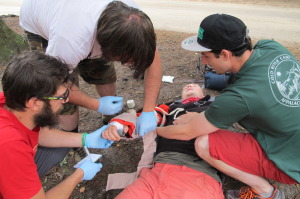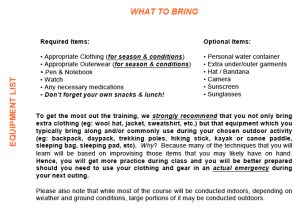WFA provides the basic level of training in a fun, hands-on format for anywhere access to EMS and a hospital is delayed.
No matter your skill or experience level, WFA is the perfect course for those who recreate or work outdoors, or who simply wants to be prepared for an emergency. Our clients include hikers, hunters, and paddlers, even nurses, EMS providers, and other first-responders. They come to us because they know that if they, or someone else, gets hurt or sick, help or backup may not necessarily be around the corner. This is why WFA is widely considered to be the minimum training required for anyone who spends time or leads groups in the outdoors.

Staff training at YMCA of the Pines, Medford, NJ
Our WFA stands apart because you’ll learn from seasoned professional emergency medical providers with real wilderness experience. Our class sizes are small, usually between 10-20 students, so that you can receive personalized instruction that meets your specific needs. This course is accredited by the the Pennsylvania Department of Health and meets the requirements of the National Registry of Emergency Medical Technicians (NREMT). This allows True North to train you to explore, protect, and lead with confidence.

From our anonymous course evaluation.
You’ll learn the dynamics of providing wilderness medical care. You will start with the importance of scene safety, then the patient assessment protocol, which is the framework of all emergency care. From there, you’ll learn about the skills, gear, and issues necessary to deal with such matters as:
- Infection control
- Neck & Spinal Injury
- Shock
- Musculoskeletal Injury
- Wound Management
- Temperature Related Illness
- Gastrointestinal Illness
- Anaphylaxis
- First-Aid Kits
- Scene Management & Evacuation Decisions
Best of all, you won’t just be learning behind a desk, but during various skill sessions, case study discussions, and, most importantly, treating “patients” during various training scenarios. Much of it will be outdoors — just like you’d find in an actual emergency — to provide you a more realistic understanding of what is involved to care for a real patient. After all, at True North, we want you to learn by doing as much as possible.
Here are the course basics:
- Course Duration: 16-hours of instruction.
- Timeframe: Two formats available … See below for details.
- Tuition: $250
- Location: Various locations … See below for details.
- Certification Length: Two (2) years
- Minimum Age: 16 years old … See below for details.
- Continuing-Education Hours: For pre-hospital providers, the Pennsylvania Department of Health has approved this course for 15 credits for EMR, EMT, Paramedic, and PHRN.
-

This course is approved for Medical / Trauma continuing-education hours for EMR, EMT, Medic, PHRN. See below for details.
This course may also meet the requirements of recertification for the National Registry of Emergency Medical Technicians: “The NREMT accepts continuing education that has received official approval through your State EMS office and/or the Continuing Education Coordinating Board of Emergency Medical Services.” For more information, please visit their FAQs.
-
- Description of the Level of Physical Difficulty – Moderate: This program will involve physical effort on terrain that is both relatively flat and includes some hills, over short distances at a slow pace on generally defined and established trails. Activities will involve outdoor and indoor portions. Activities will require lifting and squatting. No prior experience in the program is required.
Check out these answers to some commonly asked questions:
What is the timeframe of this course? We offer our WFA course in two main formats. Most often, we run it over one weekend on a Saturday and Sunday. However, can also structure it to meet the needs of a private group, or special offering — Such as, two successive Saturdays, or a series of weekday evenings. Either way, we will note it on our Schedule.
Do we run WFA as a private course? Yes! While True North offers many open registration courses, most of our WFA events are run for private groups. So we regularly work with Boy Scout troops, state and county parks departments, day and overnight camps, and church youth groups. The many benefits include personalized training which can be tailored to your specific needs. We can do this by structuring the program in a variety of time formats, or running it in various locations, either your location or ours. To learn more, just contact us.
What about the Coronavirus? True North continues to follow all Center for Disease Control and Pennsylvania Department of Health guidelines to minimize transmission of COVID.
Where is this course located? We try to hold our courses in locations that not only offer you a proper setting for learning, but also take into account such elements as easy access, ample parking, sleeping accommodations, a local business district, while also helping you to stay within your budget. Our upcoming courses locations are as follows:
- 16-17 November 2024: Outdoor Discovery Center, Ford City, Pennsylvania (60 minutes northeast of Pittsburgh / Easy access from the Pennsylvania Turnpike)
What is the minimum age to participate? Children 16-17 years old are welcome when accompanied by a parent or guardian, or as part of an organized group.
Does this course include CPR/AED training? This course does not generally include CPR/AED certification, but as an authorized American Heart Association training center, True North can certainly work with you or your group to include it or provide it separately. To learn more, check out our CPR/AED program, or simply contact us.
Where can you stay overnight? Many of our clients travel a distance to attend this course so we want to make your stay as easy and as comfortable as possible. Certainly you can stay in a local hotel, but our sites typically allow overnight stays (like the Outdoor Discovery Center in Ford City, Pennsylvania), giving you the choice of a bunk, or sleeping outside in a tent, with access to toilets, a kitchen, and hot showers. The cost is an additional $10-25 per night.
What kind of gear do I need to bring? True North will provide all of the needed training supplies. There is no required text for this course.
If you would like a better sense of what additional gear that you need to bring on the course, or optional gear to consider, then check out the equipment list that will be included with the course information sheet (just “click” on the image to enlarge) when you register.
However, since one of our course goals is to teach you about various gear, plus offer you a chance to “test drive” it before you buy it, if you don’t have an item, don’t necessarily feel compelled to buy it right away … especially if it’s expensive. Instead, contact us to see if we can loan you an item or make a recommendation for purchase.
Why should a medical professional, like a Paramedic, Nurse, or Physician, still consider taking a WFA course? In some ways, you will find the training and issues very similar to what you see in your front-country patients, but in most other respects you will find it vastly different. First, you will be learning to deal with issues that you typically won’t find in an urban environment, like snake bites, moderate to severe hypothermia, and lightening strikes. Also, wilderness medical care typically requires a greater emphasis on improvisation so we will train you to better view the equipment in your pack , or what happens to be laying around, as appropriate resources. In turn, the standard of care in wilderness environments, which is outlined by the Wilderness Medical Society (WMS), may differ substantially from your state protocols. Most importantly, many medical providers only deal with patients for brief periods (maybe just the ambulance ride to the hospital) and in teams, but, as a WFA, you may need to care for your patient for hours, maybe even even days … all by yourself.
Do you provider WFA Review classes? Yes! Like any skill, WFA is what psychologists describe as “perishable” … That is, either you “use it, or loose it.” So, even though the certification length is generally 2-years at any school nationally, most clients can attest that, unless they have periodically reviewed and practiced, their memory has “rusted” long before then. That’s why True North periodically offers short WFA Review classes as part of our Workshop series, which is open to anyone regardless of where they received their card.
If you have any other questions, or you would like to learn more, please contact us!

